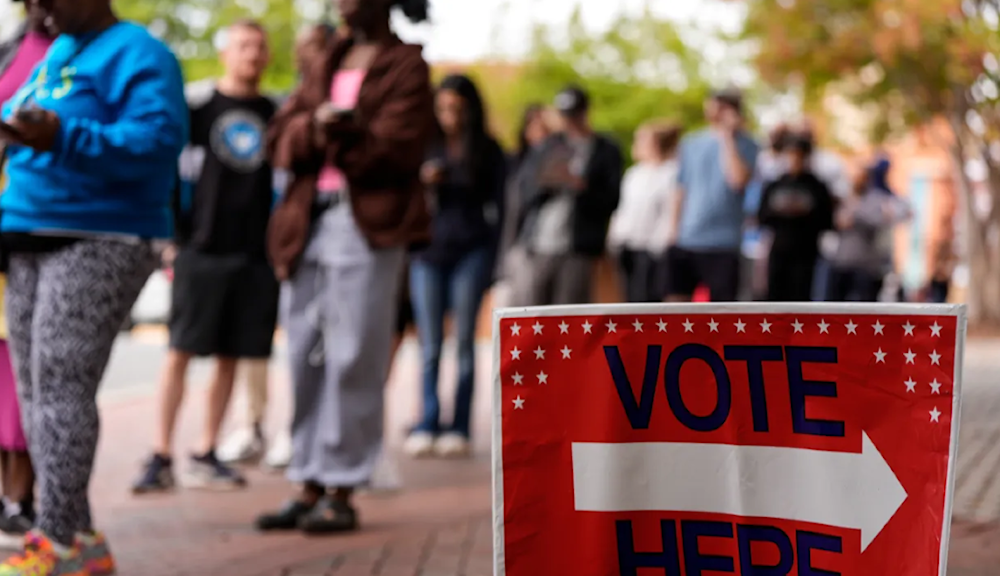Early voting numbers ‘scary’ for Harris: Former campaign manager
Jim Messina describes how contrary to this election, in the last one, Trump had instructed his supporters not to vote early, explaining his lead in early elections this time around.
-

People stand in line during the last day of early voting on November 2, 2024 in Charlotte North Carolina. (AP)
Former US President Barack Obama's 2012 campaign manager, Jim Messina, has described the early voting figures in the US presidential election as "scary" for Democratic contender Kamala Harris.
During an MSNBC interview with former White House spokesperson Jen Psaki, he called the early vote numbers a "little scary," detailing how Republican nominee Donald Trump's supporters have been far more active this time around than in the last election.
Messina detailed how contrary to this election, in the last one, Trump had instructed voters not to vote early and "Republicans do have an advantage in early vote numbers. When the early vote comes in, it is going to look a little bit different than 2020."
Messina divulged that early voting numbers had let many to "call me panicking," but emphasized that Harris' campaign had reasons to be "very, very happy." It's because two key vote blocs for the Democratic nominee are "coming big," according to the former campaign manager.
41% of early voters are Democrats
Women account for more than half of early votes, and "in the past ten days, young voters in these battleground states are coming out in what looks to be... historic numbers," Messina added.
An estimated 76.2 million mail-in and early in-person ballots have already been cast in the United States as reported by NBC.
41% of early voters are Democrats, 39% are Republicans, while the other 20%'s party membership is unknown.
However, more Republicans voted in four of the seven competitive states, with Arizona having the greatest advantage at 42% to 33%.
According to NBC, 53% of early votes were women, with 20% falling between the ages of 18 and 39.
Latest polls show Harris, Trump in deadlock
The US presidential election campaign enters its final weekend with polls showing Donald Trump and Kamala Harris in a seemingly permanent deadlock and few clues as to which of them will prevail on Tuesday.
At the end of a chaotic week that started with Trump’s racially charged rally in New York and included celebrity endorsements and misogynistic comments, The Guardian’s 10-day polling average showed little change. Voter loyalty to candidates appeared largely unaffected by these events.
Nationally, Harris, the Democratic nominee, holds a narrow one-point lead over her Republican opponent, 48% to 47%, which is nearly unchanged from last week. This lead is within the margin of error for most polls.
Candidates in dead heat
In battleground states, the race is equally tight. Candidates are tied at 48% in Pennsylvania, considered a key swing state due to its 19 electoral votes. Harris leads by a point in Michigan and Wisconsin, while Trump holds a slight edge in the Sunbelt, leading by 1% in North Carolina and 2% in Georgia and Arizona. In Nevada, his average lead in the polls is less than one percentage point.
As of Friday, the latest polling comes amid record early voting, with about 65 million Americans having already cast their ballots across multiple states.
According to The Guardian, predicting future results from early voting is notoriously challenging. However, Politico reported that 58% of early voters in Pennsylvania aged 65 and over were registered Democrats, compared to 35% who were Republicans. Despite the two main parties having roughly equal numbers of registered voters among older adults in the state, about 53% of this demographic voted for Trump in Pennsylvania in 2020, even though he lost to Biden.
Unlike four years ago, Trump is now encouraging his supporters to vote early, The Guardian said. It said the higher turnout among Democrats could be a positive sign for them in this bellwether state, where analysts believe turnout will be crucial for the outcome, adding that Democratic strategists have claimed a 10%-20% lead in senior voter turnout across the three blue-wall states.

 4 Min Read
4 Min Read








